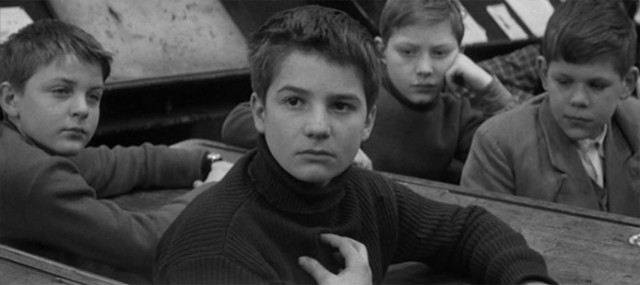
Antoine Doinel (Jean-Pierre Léaud) can’t seem to stay away from trouble in François Truffaut’s THE 400 BLOWS
CABARET CINEMA: THE 400 BLOWS (LES QUATRE CENTS COUPS) (François Truffaut, 1959)
Rubin Museum of Art
150 West 17th St. at Seventh Ave.
Friday, October 26, free with $7 bar minimum, 9:30
212-620-5000
www.rmanyc.org
 “They won’t be happy you’re missing school like this,” a man tells fourteen-year-old Jean-Pierre Léaud as he’s auditioning for the part of Antoine Doinel in François Truffaut’s The 400 Blows. “It doesn’t matter, as long as I’m happy,” Léaud responds. Screening on October 26 as part of the Rubin Museum Cabaret Cinema series “Happiness Is . . . ,” where it will be introduced by Columbia professor and Truffaut expert Annette Insdorf, The 400 Blows marked the first of five films, including one short, in which Léaud played the iconic character, as audiences around the world followed his search for happiness. In The 400 Blows, Doinel is a twelve-year-old kid who loves Balzac, has never seen the ocean, and is always getting into trouble with his parents, who treat him more like a problem than a son. He is clearly very smart, but he does poorly in school, where he is harassed by his teacher (Guy Decomble). One day when he decides to play hooky, he catches his mother (Claire Maurier) kissing another man, and instead of telling his father (Albert Rémy), he runs away from home, moving in with his friend René (Patrick Auffay), setting off a series of events that lead to a whole lot more trouble and an unforgettable final shot. The 400 Blows is one of the most intelligent films ever made about adolescence, a tender, honest portrayal of a mischievous kid who just wants to be understood. Léaud gives a wonderfully nuanced performance that makes Antoine a uniquely believable and sympathetic character even when he is making some very bad choices. The film is also about escape of all kinds, beginning and ending with the camera racing away alongside Jean Constantin’s glorious score. The Adventures of Antoine Doinel series continues with 1962’s Antoine and Colette, 1968’s Stolen Kisses, 1970’s Bed and Board, and 1979’s Love on the Run, while “Happiness is . . .” continues through December 28 with such films as Ingmar Bergman’s Cries and Whispers, Michael Curtiz’s Casablanca, and George Cukor’s Camille, held in conjunction with the larger Rubin Museum program “Happy Talk.”
“They won’t be happy you’re missing school like this,” a man tells fourteen-year-old Jean-Pierre Léaud as he’s auditioning for the part of Antoine Doinel in François Truffaut’s The 400 Blows. “It doesn’t matter, as long as I’m happy,” Léaud responds. Screening on October 26 as part of the Rubin Museum Cabaret Cinema series “Happiness Is . . . ,” where it will be introduced by Columbia professor and Truffaut expert Annette Insdorf, The 400 Blows marked the first of five films, including one short, in which Léaud played the iconic character, as audiences around the world followed his search for happiness. In The 400 Blows, Doinel is a twelve-year-old kid who loves Balzac, has never seen the ocean, and is always getting into trouble with his parents, who treat him more like a problem than a son. He is clearly very smart, but he does poorly in school, where he is harassed by his teacher (Guy Decomble). One day when he decides to play hooky, he catches his mother (Claire Maurier) kissing another man, and instead of telling his father (Albert Rémy), he runs away from home, moving in with his friend René (Patrick Auffay), setting off a series of events that lead to a whole lot more trouble and an unforgettable final shot. The 400 Blows is one of the most intelligent films ever made about adolescence, a tender, honest portrayal of a mischievous kid who just wants to be understood. Léaud gives a wonderfully nuanced performance that makes Antoine a uniquely believable and sympathetic character even when he is making some very bad choices. The film is also about escape of all kinds, beginning and ending with the camera racing away alongside Jean Constantin’s glorious score. The Adventures of Antoine Doinel series continues with 1962’s Antoine and Colette, 1968’s Stolen Kisses, 1970’s Bed and Board, and 1979’s Love on the Run, while “Happiness is . . .” continues through December 28 with such films as Ingmar Bergman’s Cries and Whispers, Michael Curtiz’s Casablanca, and George Cukor’s Camille, held in conjunction with the larger Rubin Museum program “Happy Talk.”